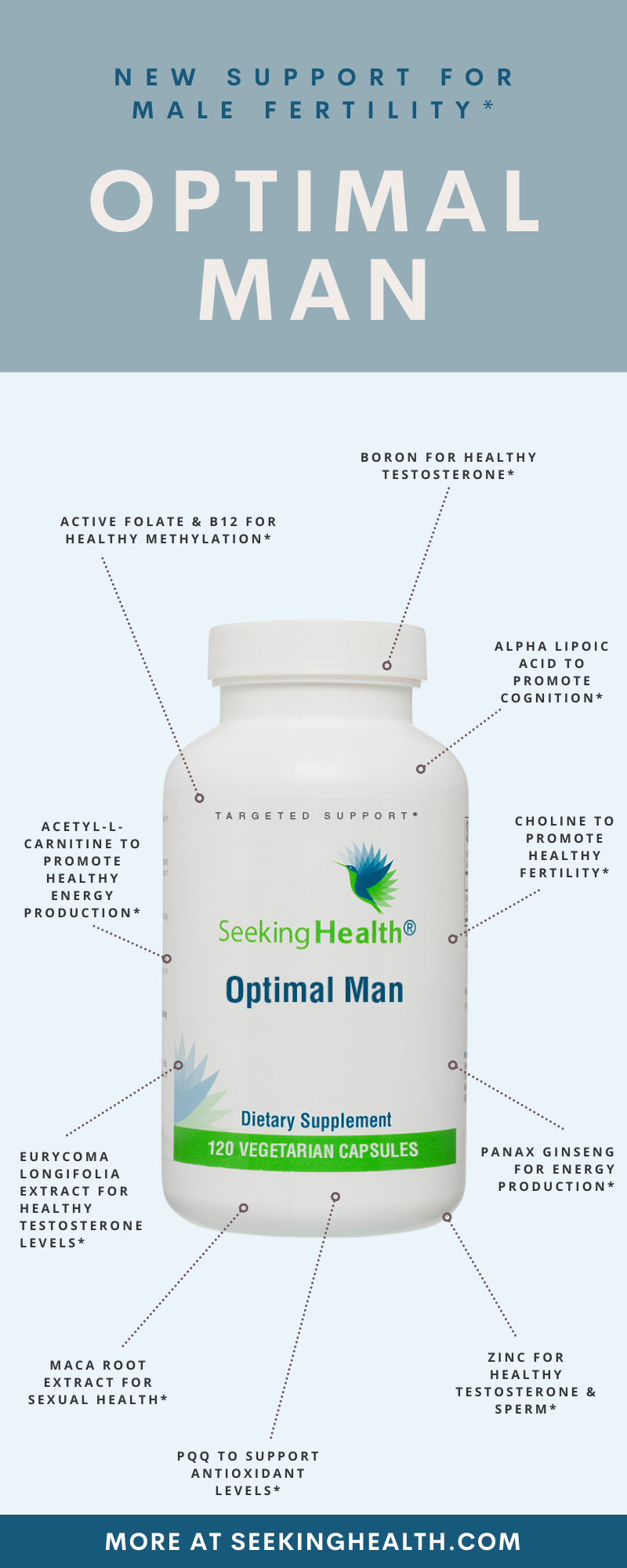
800-547-9812
800-547-9812
800-547-9812
800-547-9812

Most men would rather not think about fertility. Yet understanding it is precisely what can help you know when something isn’t right.
Between six and 12 percent of couples in the U.S. will struggle to get pregnant or take longer than a year to do so. For couples where the female is under age 35, taking longer than one year to get pregnant is considered abnormal.† (1)
You may be reading this because you’re struggling to conceive. Maybe your partner wants to support natural fertility. Or perhaps you’re looking for trusted information on dietary supplements that support good sperm quality.†
Fertility problems can be a challenging diagnosis. But there are natural things you can do to support sperm health. A healthy diet and targeted supplementation can go a long way to promote prenatal health in both men and women.†

There are many causes of infertility. In about 35 percent of cases, male factor infertility occurs with a female factor. For around eight percent of couples, a male factor is the only cause. (1)
It’s easy to blame yourself when it’s hard to conceive. But most infertility factors are at least partly out of a person’s control. Natural lifestyle changes can support healthy fertility in men.† True medical causes of infertility, though, require assistance from fertility specialists.
When a couple is struggling to get pregnant, testing both partners is important. This determines if there is more than one factor at play. It can also help to identify which partner may need support. People assume that if a woman can’t get or stay pregnant, that it is her problem. But male infertility factors contribute to problems getting pregnant as well as recurrent miscarriages.

Infertility in men happens for different reasons. Sometimes a patient will have more than one condition. Doctors assess male fertility by performing a semen analysis.
The results of semen analysis can pinpoint whether:
Problems with fertility in men generally involve semen quality or related factors. (1)
Sperm is made and stored in the testicles. (2) Spermatogenesis is the term for making new sperm. This happens on a daily basis. However, it takes around 64 days before sperm are fully matured and able to fertilize an egg. Sperm production problems or abnormal sperm parameters, like maturation, can lead to trouble getting pregnant.†
Most problems with male fertility come from how the sperm is being produced or released. This includes abnormalities like†:
There are several ways a man may experience infertility. The cause can often be identified with a few tests, and a treatment plan can be formed.
Male fertility isn’t about only one thing, but natural support is possible. This includes healthy testosterone balance. It also involves adding or removing lifestyle factors that may affect how sperm are made or stored. Natural fertility support for men falls under a few simple categories.

This one is the most straightforward but does involve changing some long-term habits. Because the testicles store sperm and must prevent it from overheating, it’s important to keep them from overheating, too. This means†:
These common-sense activities protect the testicles from unnecessary trauma and support balanced hormone levels. Avoidance of toxins is also vital for protecting the body’s antioxidant stores. These are needed to keep sperm from oxidative damage.
Even if damaged sperm have proper volume or motility, when it comes to fertilizing an egg, you need the best quality possible. It’s the 23 chromosomes from this one sperm that will pass along genetic information to your future offspring. You want to make sure that the messenger is of the best quality!

There is no one-size-fits-all fertility diet for men or women . But there are some basic nutritional needs that support good epigenetic health. These include eating plenty of vegetables and whole foods, cutting down on processed and junk foods, reducing or eliminating added sugars, and consuming plenty of healthy fats.†
The specifics of how your diet looks, if you really want an optimized plan, are best determined by a qualified nutritionist. But the basic concepts are outlined in Dirty Genes,† Dr. Ben Lynch’s groundbreaking book. If you’re eating to optimize your health on a genetic level, fertility will naturally follow.†

There isn’t a set exercise plan that will optimize your fertility. But no physical activity at all can be damaging to your fertility and your health. Over-training and extremely intense physical activity or athletic training can also be problematic for fertility. (4) When it comes to movement, a balanced amount of physical activity is best.
You can choose the type of physical activity that works for you. Remember, bicycling is not a fertility-friendly activity. Whether you choose to walk, lift weights, practice Tai-Kwan Do, or a combination of several different exercise approaches, find something balanced that you can stick with. Moving your body promotes overall health, supports epigenetic wellness, and normalizes hormone levels.
There are a lot of male fertility supplements on the market. Before you run out and get one, consider that many of them aren’t research-backed. The market likes to capitalize on people’s fears over being unable to conceive. Many of these supplements are made with cheap ingredients, fillers, or other components that might actually be harmful to fertility.
If you want to take supplements to support fertility, it’s important to do it in an evidence-based way.
Research shows that antioxidants are some of the most effective nutritional supplements to support male fertility. These especially include vitamin C, vitamin E, and coenzyme Q10. Research in the International Journal of Reproductive BioMedicine found these nutrients to be effective for improving semen parameters in infertile men, supporting sperm volume, motility, morphology, and even the potential to improve DNA integrity.† (5)
PQQ, short for pyrroloquinoline quinone, is another antioxidant that can be helpful.† Choline is a nutrient, naturally found in eggs and fish, that supports fertility in both men and women.†
Other supplemental nutrients can be beneficial for supporting sperm integrity, healthy testosterone levels, and normal methylation—all of which are essential for producing high-quality sperm. Proper methylation is necessary for fertilization. It doesn’t matter how high the sperm volume is if the DNA material that is transported isn’t of good quality. Active folate, not folic acid, is just as important for male fertility as it is for females.† Active B12 works with folate to support a healthy methylation cycle, so you need both of these together.†
Supporting testosterone levels naturally does not only mean trying to increase them. Too much testosterone is just as bad for fertility as too little.† What you want is balance. Certain nutrients help the body to produce balanced hormones. These can include the minerals boron and zinc, as well as some herbs, like maca root, Panax ginseng, and Eurycoma longifolia extract.†
Acetyl-L-carnitine has antioxidant properties and plays a major role in how sperm are produced and mature. (6) Alpha-lipoic acid works as an antioxidant to protect sperm motility and viability, as well as supporting DNA integrity, by reducing oxidative damage factors.† (7)
That’s a lengthy list of supplements! Many men may feel frustrated at having to take a handful of pills in addition to diet and lifestyle. That’s why epigenetics expert, Dr. Ben Lynch, created a male health support formula that combines these research-backed nutrients into a single formulation.†
It’s called Optimal Man. It’s not only for men who are trying to conceive, but the nutrients it contains will support healthy fertility.†

Optimal Man was designed for men ages 20 and up who want to optimize the DNA passed to their future children.† It contains targeted nutrients that support men’s health. In particular, balanced hormones and healthy sperm.†
Optimal Man contains these targeted ingredients:
While supplements alone won’t optimize fertility, when combined with lifestyle and dietary factors, they can support healthy fertility.†

What happens if you try lifestyle changes, diet, and supplements, but your infertility diagnosis doesn’t respond to them? What happens if you’re still struggling to conceive?
Treatments for male infertility may include medical, surgical, or assisted reproductive technology (ART) interventions. (1) This could mean a procedure to correct a varicocele or in vitro fertilization (IVF). It could also mean many other things, but the most important thing is that an infertility plan is individualized to you and your partner’s needs.
Medical and surgical treatments for male infertility are managed by urologists who specialize in this area. Reproductive endocrinologists may also be part of a treatment team if IVF is involved, or if your female partner is also being treated for infertility.
Infertility isn’t rare. But two partners can have their own set of complications. The important thing to remember is that there are things you can do to address this.
You have options. You can make lifestyle and nutritional changes to support healthy epigenetics. You can undergo fertility treatments. You can choose supplements designed for your needs. Whatever you choose, it’s important to know that you have options.
Optimal Man is designed to remove the stress from finding the right supplement. Whether you’re trying to conceive or not, this product was designed with men in mind. Most supplements are not! You’re not one-size-fits-all, and your supplement shouldn’t be either.
Get Optimal Man here.
Leave a comment